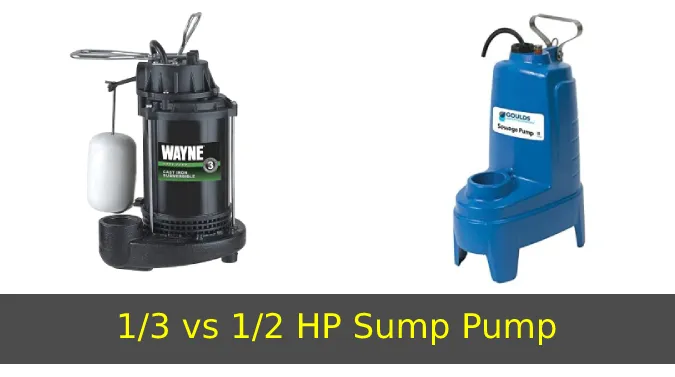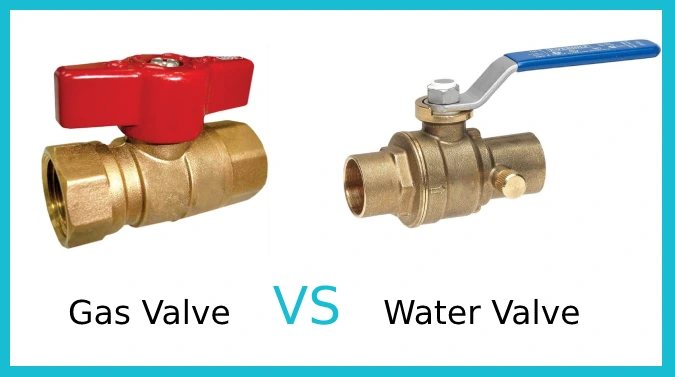Last Updated on July 16, 2023
For homeowners in areas prone to flooding, a sump pump is an essential part of their plumbing system. When selecting the right machine, 1/3 and 1/2 hp models have repeatedly proven reliable and efficient choices for maximum protection.
But with 1/3 and 1/2 hp models available, how do you decide which fits your needs? An average sized basement calls for a reliable and efficient 1/3 hp model, while extensive pumping power and capabilities are required for a 1/2 sump pump.
Carefully compare specs such as output, handling and lifting capacity, energy efficiency, and durability to find the perfect sump pump. This way, it meets all your requirements and saves you time & money in the long run.
Dive in to uncover the subtle differences between 1/3 and 1/2 hp models, helping you find which one fits your needs perfectly.
Difference Between a 1/3 vs 1/2 HP Sump Pump

Your sump pump is the unsung hero of your home, tackling any water buildup to keep everything dry. With so many options available, choosing one can be overwhelming.
Doing a little comparison shopping between 1/3 and 1/2 hp pumps helps you make an informed decision that will ensure optimal wellness for your home.
1. Flow Rate:
The biggest difference between a 1/3 HP and 1/2 HP sump pump is their flow rate. A 1/3 HP sump pump has lower pumping power and, thus a lower flow rate than a 1/2 HP model. This means it may not be able to handle as much water as quickly, making a 1/2 HP pump the better choice if you’re dealing with heavy rains or high volumes of water in your sump pit.
2. Water Handling Capacity:
Both a 1/3 hp and a 1/2 hp sump pump can efficiently handle most water problems found in residential basements and crawl spaces. But the 1/2 hp sump pump gives it an edge when faced with difficult circumstances.
For instance, if you live in an area where rain is especially heavy for long periods, you’ll likely need the increased capacity of a 1/2 HP model to drain your pit adequately. On the other hand, if rainfall rates are moderate or consistent with standard averages, then the standard 1/3 HP will do just fine.
If you only have a small space, such as a single room basement, you may get away with using a 1/3 hp pump instead. Remember that using an undersized model may lead to inadequate water drainage or flooding due to inadequate pumping capacity.
3. Discharge Capacity:
The larger motor size of a 1/2 hp sump pump allows greater discharge capacity compared to its smaller counterpart. This means it can move greater volumes of water out of your home without needing to be emptied as often as its weaker alternative.
4. Vertical Lifting Capacity:

Depending on how high you need to lift water out of your home’s foundation, either type could suit your needs. Usually speaking, a 1/3 hp sump pump is equipped to handle 7-10 feet from its source location. It can cater to a 90-degree elbow, running through 3 and 25 feet of horizontal piping.
But a 1/2 hp sump pump can manage higher vertical lifts than 1/3 hp sump pump when discharging water from its source location. It makes it better suited for homes located in flood prone areas or those with particularly deep foundations.
5. Energy Efficiency:
1/3 HP sump pumps typically have less power than 1/2 HP models and use less electricity. Higher powered 1/2 HP pumps may require more frequent maintenance to ensure they function optimally and don’t use too much energy.
A 1/2 hp pump can also be more prone to overheating due to its significant power output. On the other hand, smaller 1/3 HP models have lower power outputs that generally require less frequent maintenance, resulting in a more efficient sump pump overall.
6. Motor Durability:
The size of the motor plays a significant role in its durability over time. Larger motors tend to last longer because they can withstand more wear and tear from continuous usage than smaller motors.
A 1/2 HP motor has greater strength than a 1/3 HP motor as it has larger components that can handle higher levels of stress. As a result, it’s better for heavy loads or long operations.
The lower powered 1/3 HP motor is unable to handle long-term heavy demands more than its larger counterpart. It leads to shorter lifespans or premature failure due to a lack of proper upkeep or maintenance.
7. Cost:
When comparing costs between different types of sump pumps, it’s important to note that typically larger sizes come at a premium price compared to smaller ones. Larger motors offer improved performance, making them ideal for certain applications such as heavy duty pumping scenarios.
But if all you need is basic draining capabilities, then going with an appropriately sized but lower powered model such as a 1/3 hp might be the better option. Compared to bigger motors, it’s cheaper upfront and uses less energy.
1/3 vs 1/2 HP Sump Pump: Which One Should You Choose?

When choosing between a 1/3 or 1/2 HP sump pump, it is important to consider all factors before deciding. Ultimately, the choice depends on the individual’s specific requirements and budget.
A 1/3 HP sump pump is better for energy efficiency and at a lower price. Conversely, a 1/2 HP sump pump has a higher water flow rate, greater water handling capacity, larger discharge capacity, higher vertical lifting capacity, and more motor durability.
Taking into consideration all of the variables, such as the size of the sump basin, total dynamic head (TDH), and cost-effectiveness can help ensure that you select the best sump pump for your needs.
Both types of pumps are reliable and efficient choices compared to other models. However, depending on the specific application requirements, one may be the more suitable choice.
How deep can a 1/2 HP well pump go?
A 1/2 HP well pump can typically reach depths of up to 150 feet depending on the type of backup pump, well casing, water table level, and other factors. The deeper the well, the more pressure is required to push the water up and out.
It is recommended to consult with a professional before selecting a backup sump pump, as they can provide proper advice considering all necessary variables.
How much water can a 1/3 hp pump move?
The amount of water a 1/3 hp pump can move depends on several factors such as its efficiency, the height and distance the water needs to be pumped, and other external factors.
Generally speaking, this type of pump can pump up to 42 gallons per minute (GPM) or 25,000 gallons per hour. Selecting an appropriately sized pump with the appropriate flow rate for your specific needs is crucial to perform properly.
What’s the maximum amount of water a 1/2 hp sump pump moves?
A 1/2 hp sump pump is designed for moving large volumes of liquid such as wastewater, rainwater, or groundwater from lower elevations to higher ones. This kind of pump usually has a capacity ranging from 55 GPM or 3300 gallons per hour, depending on factors like height and distance.
Make the Right Choice Between 1/2 hp and 1/3 hp Sump Pumps
Don’t get trapped in a 1/2 hp or 1/3 hp sump pump decision. Understanding what purpose you need your pump to serve, comparing them side by side, and understanding their benefits will help ensure you make the best choice for your home.
Weigh all of these factors carefully before purchasing one, as choosing the wrong pump could result in costly repairs later on down the line. The pump size should be based on the size of your basement and your requirements for pumping power.



